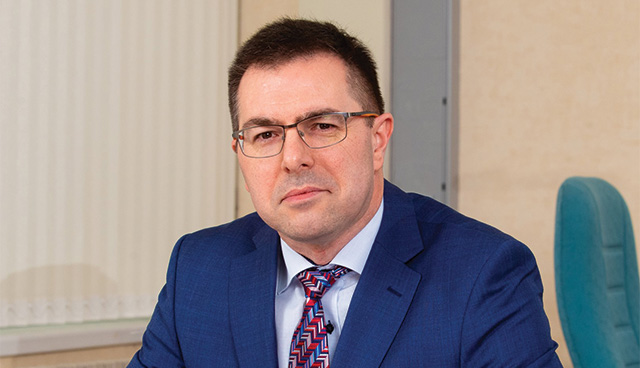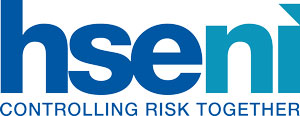Controlling risk together

Health and Safety Executive for Northern Ireland (HSENI) Chief Executive, Robert Kidd, discusses the pandemic’s impact on the promotion and enforcement of health and safety at work standards in Northern Ireland.
Describing the “huge challenges” faced by the organisation over the past 12 months, Kidd says that one of the several positive outcomes of adopting an agile approach to an intense workload has been the raising of HSENI’s profile to an unprecedented level.
HSENI is an executive non-departmental public body sponsored by the Department for the Economy (DfE) and operates under the mission to collaborate with others to reduce work-related serious injury and ill-health in Northern Ireland. This partnership working has been built up with industry bodies and key stakeholders over many years.
Kidd explains that their extensive remit, covering mainly industrial sectors, ranging from agriculture and food production through to manufacturing and construction, has been expanded further as a result of the pandemic, especially in its role as educator, advisor and as a support to employers and employees. Local authority colleagues cover high street office, retail, food and leisure activities.
Despite the scale of its remit, HSENI is not a large organisation. However, with around 115 staff, 40 of whom are inspectors, it does house a diverse range of skillsets. As Kidd explains, its work requires collaboration, something which has been ramped up during the Covid pandemic as it sought to ensure safe working environments and habits in a time of unprecedented change. This collaboration stretched from company management, trade unions and trade bodies through to the district councils and other government departments.
Outlining the “dramatic changes” needed within his own organisation at the onset of the pandemic, Kidd points to an overnight pivot to remote working for staff and a recognition of the immediate shut down for many sectors. For those sectors that remained operational, the Chief Executive says that HSENI faced the mammoth challenge of applying public health guidance in the workplace and working to identify the most appropriate mitigations to ensure these industries could continue to function while also keeping people safe.
HSENI’s Deputy Chief Executive in the Field Operations Division, Bryan Monson, recognised an immediate spike in demand of HSENI service relating to advice and complaints around workplace conditions.
“We had to very quickly develop a new operating model to meet that demand,” he explains, adding: “As an organisation we have become even more agile and introduced alternative ways of working to ensure proper standards are in place.
“Much of the early work moved to remote delivery due to the huge spike in demand. Concerns from business and employees could be addressed swiftly in this way, providing essential advice and support.”
“All of this new technology brings challenges to HSENI as we look to the requirement for regulation and the training needed in relation to installation and maintenance to work in those industries. Integrating effective health and safety management into the development and deployment of new and novel technologies is imperative to underpin Northern Ireland’s decarbonisation activities.”
— Kevin Neeson, Acting Deputy Chief Executive, Services Division
Monson outlines that initial work focused on pre-identification of high-risk businesses and sectors and identifying how best to intervene, for example in food production the organisation embarked on biweekly meetings with the Department of Agriculture, Environment and Rural Affairs (DAERA), trade representatives and individual businesses to gather evidence, develop best practices and improve controls. Work that he says has been essential to managing a community transmissible virus’ impact on the workplace.
“In focusing on the mitigation of risk, we started to talk to people about things that were essentially not in HSENI’s initial remit. For example, sick pay and how that can impact on a staff members decision to come into the workplace, even if symptomatic. We also got involved in assisting the Public Health Agency with messaging around issues such as car sharing.”
The organisation shifted its mindset from a focus purely on health and safety regulations to one of ensuring compliance with public health guidance in the workplace. Monson says that while enforcement sanctions were necessary in some instances, most businesses HSENI interacted with appreciated the benefits of improving procedures and workplaces and welcomed the support.
Resources
Another change introduced by HSENI to conduct its operations was the repurposing of some staff. HSENI’s Covid inspections now required teams of two on site. Typically, non-Covid inspections would be conducted by one inspector, however, recognising the increased risks, a lead inspector was supported by an additional member of staff, newly appointed trainee inspectors or compliance officers which allowed our capacity to be maintained.
While the switch brought about many advantages, especially in relation to trainee experience, it highlighted the existing resource challenge facing HSENI. Kidd explains that trainee inspectors require some two-and-a-half years of training prior to qualification.
Kidd says that the issue of resource is something that they have had and continue to have discussions on to ensure that the organisation is future proofed for the years ahead.
“I must pay tribute to all of the staff in the organisation who have worked long hours but also been hugely flexible in assisting colleagues in other teams as the spikes in demand emerged,” he states.
Wellbeing
While a lot of the focus of HSENI has been on the pandemic, this work remains an extension of the organisation’s workstreams, a core element of which is workplace wellbeing.
Establishing that a worker’s health should not suffer, or their life be shortened because of the type of job they do, Deputy Chief Executive of HSENI’s Specialist Sectors Division, Nikki Monson, points to three key priorities for HSENI in relation to occupational health. These are occupational lung disease; occupational cancers; and musculoskeletal disorders (MSDs) and stress.
HSENI estimates that some 355 deaths per year are linked to past exposure to harmful substances in the workplace. Additionally, official figures show that in the region of 16,000 employees in Northern Ireland suffer from stress, anxiety or depression caused or made worse by work, resulting in an estimated loss of 373,000 days to the Northern Ireland economy per annum. The economic cost is estimated at some £238 million per annum and the human cost on family, friends and co-workers is immeasurable.
“As the Chair of HSENI, I am immensely proud of how the organisation has addressed the Covid-19 pandemic over the past year. While Covid has presented many unforeseen problems to be overcome, the strategic direction of HSENI continues to focus on the principles of keeping people safe and healthy in the workplace.”
— Derek Martin, Chairman
Monson highlights a concern that these figures may intensify as a result of Covid and points to a preventative approach adopted by HSENI.
“The aim is being able to identify those factors that cause work-related stress and make sure they are effectively managed,” she says, explaining that its Mental Wellbeing at Work Advisory Service (MWAWAS) has continued to deliver a series of programmes digitally throughout the past year. Indicating its commitment to ensuring workplace wellbeing is a consideration of all sectors, the HSENI recently expanded the service into the extractive industry, not a traditional sector for looking at work-related mental health.
“It made sense to continue to use the technical base within HSE (GB) as opposed to standing up the very considerable staffing structures in Northern Ireland.”
— Louis Burns, Deputy Chief Executive, EU Exit and Legislation Division
Speaking positively about how the sector has embraced the programme, Monson reveals that the organisation will soon roll out a new work programme on burnout and fatigue to help prevent mental ill-health from developing within industry.
“It is in everyone’s interest to manage employee health and given the amount of time we spend in the workplace to look for opportunities to improve health also,” says Monson.
Future-scanning
HSENI is cognisant of life beyond Covid-19 and while Kidd admits that demand has tended to move to particular areas as a result of Covid, he stresses that inspectors retain a focus on wider health and safety aspects while on the ground.
Bryan Monson takes up the point emphasising that HSENI is continuously future-scanning, meaning that it is designing future work programmes that are flexible to falling or rising levels of Covid threat. In this regard, HSENI is also interacting with businesses to ensure that they have consideration of the sustainability of their Covid measures and developing scaled responses, allowing them to operate more flexibly at times of low risk but also move quickly if that scenario changes.
Acting Deputy Chief Executive of HSENI’s Services Division, Kevin Neeson, stresses that the risks being dealt with by HSENI pre-Covid still remain and the organisation continues to deal with those, albeit in a changed manner. Future-scanning, he states, also means that HSENI is focused in proactively addressing the challenges of the future, not least the emergence of new technology.
Homing in on ambitions from governments across the globe for decarbonisation, Neeson points to developments in renewable energy generation ranging from wind turbines to hydrogen injection of the natural gas grid through to anaerobic digestion.
“All of this new technology brings challenges to HSENI as we look to the requirement for regulation and the training needed in relation to installation and maintenance to work in those industries. Integrating effective health and safety management into the development and deployment of new and novel technologies is imperative to underpin Northern Ireland’s decarbonisation activities.”
Brexit
Amidst efforts to tailor its existing work to the effects of the pandemic, HSENI retained a focus on the Brexit impact of their operations. As a relatively small organisation, HSENI relies heavily on its sister organisation in Great Britain, which possesses much broader administrative, policy and technical functions.
“As an organisation we have become even more agile and introduced alternative ways of working to ensure proper standards are in place.”
— Bryan Monson, Deputy Chief Executive, Field Operations Division
Louis Burns, the HSENI’s Deputy Chief Executive of the EU Exit and Legislation Division outlines a dependency of HSENI on their counterparts in HSE (GB), which he explains has been tested as a result of Brexit.
HSENI has a key role in areas such as chemicals, product safety and legislation. Under the Northern Ireland Protocol some EU rules still apply in Northern Ireland and not in Great Britain. One example is in EU biocides legislation.
“I must pay tribute to all of the staff in the organisation who have worked long hours but also been hugely flexible in assisting colleagues in other teams as the spikes in demand emerged.”
— Robert Kidd, Chief Executive
The organisation faced the prospect of having to stand up new staff to complete very technical work but as Burns explains, economies of scale would not have been practical.
To this end, HSENI is involved with DfE, DAERA and Department of Justice in establishing agreements that would see HSE (GB) continue to provide technical support to allow for the Northern Ireland team to discharge its functions, which Burns says has been by UK Government departments.
Burns adds that HSENI has had to develop two new teams in the areas of chemicals and product safety and while this has increased the workload of HSENI, benefits of the work include HSENI adding “another opportunity” to protect workers safety and assist local businesses.
Future
Re-emphasising the prospect of greater challenges around workplace wellbeing in relation to Covid-19, Kidd says that preventing future work related stress will require a particular focus as society assesses the impact of isolation and changed interactions.
Bryan Monson is confident that lessons around sustainability of measures in relation to Covid can be harnessed and integrated into the broader health and safety approach, with businesses recognising the benefits the approaches adopted in the last 12 months have generated.
Nikki Monson added: “We also aim to focus on our own staff development and wellbeing, ensuring that we have a workplace that benefits the wider work that we do.”
“It is in everyone’s interest to manage employee health and given the amount of time we spend in the workplace to look for opportunities to improve health also.”
— Nikki Monson, Deputy Chief Executive, Specialist Sectors Division
Looking to the future and the year ahead for HSENI, Kidd says that the organisation will in addition to retaining its focus on delivery of its statutory functions, “concentrate on building our capacity to enable us to meet the emerging demands of an evolving work environment and what we may see in a post-Covid world for everyone.
“We look forward to working with new board members, acknowledging the contribution of the existing board, and bringing forward a strategy which supports businesses into the future. As an organisation, we hugely value the support and working relationship built with the Department for the Economy and the Committee.”
Health and Safety Executive for Northern Ireland
83 Ladas Drive, Belfast, BT6 9FR
T: 0800 0320 121
E: mail@hseni.gov.uk
W: www.hseni.gov.uk


